About Tennis & Life CampsOur Mission: Transforming tennis and life through the Three Crowns, Positive Attitude, Full Effort, Good Sportsmanship
Overview
TLC provides a unique learning experience through our Three Crowns℠ training techniques. We teach concentration and relaxation techniques, confidence-building strategies, match strategies for beginners to advanced player and mechanics you can count on when the match gets tight.
What we apply on the court can be applied to every area of your life. We call these the Three Crowns• Positive Attitude • Full Effort • Good Sportsmanship℠.
We do all this through first-rate instruction, humor, reflection, music, and interactions with campers on and off the court. Our instructors will not just teach you tennis and leave you once they walk off the court. They will dine with you, counsel junior campers, carry your luggage, be in a variety show act with your child, play GVS (Groundstroke, Volley, Smash) with you, and be there for you because they believe in you as a player and a person.
The Three Crowns℠ Philosophy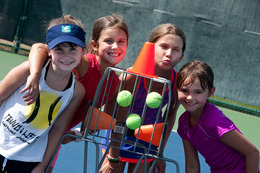
Positive Attitude: Things can and will go
wrong in tennis and in life. A positive attitude is
not about being “happy,” but choosing the next
action that will move you forward.
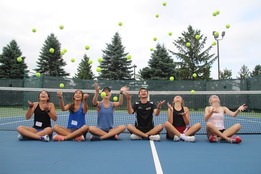 Full Effort: No one can make you give up.
Full Effort: No one can make you give up.
Not your coach, your parent, your boss, your
opponent, or your teammate. Only you can.
You have the choice to continue giving your all,
regardless of circumstances.
Good Sportsmanship: Every single act of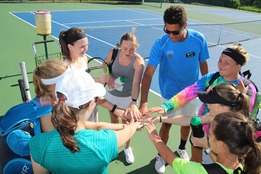 sportsmanship on and off the court can be
sportsmanship on and off the court can be
summed up in one sentence: Treat others the
way you/they want to be treated. It is always a
choice and always an action.
At TLC, we teach effective techniques to focus on
what is in our control on and off the court,
and how to let go of what is not.
How our philosophy prepares you for both tennis and life: TLC knows that maintaining a positive attitude through tragedy, difficulty, and losses is challenging. Both tennis and life are full of unfairness and disappointment. Yet obstacles can be overcome by focusing on the things within our control (The Three Crowns) and letting go of the things outside our control (winning, playing well, other people’s actions, illness, systemic inequities, even death). We frame the Serenity Prayer (first introduced by AA and Twelve Step Programs) as a practical, non-sectarian tool for identifying these things. “Grant me the serenity to accept the things I cannot change; the courage to change the things I can; and the wisdom to know the difference.” It is a universal principle that includes all people regardless of religious affiliation.
Our Challenge to Campers and Ourselves: We challenge campers and ourselves to ask: How can we build bridges to those who believe differently from us by putting ourselves in their shoes? We affirm service to others as a key to a fulfilled life.
 Committed to Equity: As a leader in sports camps and in line with our mission, we work to educate, ally, and advocate for change of systems that provide unfair advantage of one group over another, whether that be race, gender, religion, sexual orientation, or economic. And we welcome all to participate in this endeavor with us.
Committed to Equity: As a leader in sports camps and in line with our mission, we work to educate, ally, and advocate for change of systems that provide unfair advantage of one group over another, whether that be race, gender, religion, sexual orientation, or economic. And we welcome all to participate in this endeavor with us.
Our Teaching Method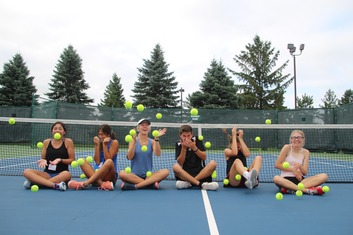 Keep it Simple. The simpler the mechanics, the fewer moving parts that lead to mechanical breakdowns; the fewer moving parts, the greater the chance of maintaining a consistent game when players get tight in a match or become fatigued. Simple and precise beats complicated and flashy in the vast majority of players. The simpler you can make it, the better you will become. The more consistent you will become. The more matches you will win.
Keep it Simple. The simpler the mechanics, the fewer moving parts that lead to mechanical breakdowns; the fewer moving parts, the greater the chance of maintaining a consistent game when players get tight in a match or become fatigued. Simple and precise beats complicated and flashy in the vast majority of players. The simpler you can make it, the better you will become. The more consistent you will become. The more matches you will win.
Focus on what players do well and build from there. This accelerates the learning process, builds confidence, and improves motivation. Our method is student-centered, not teacher-centered, so that the lessons a player learns they retain as a part of their muscle memory when they leave camp and can navigate the game even when a teacher is not always there to instruct. We want our campers to become their own best teachers.
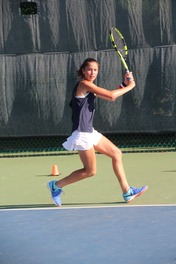 Tennis as the perfect sport for learning life skills. As with strokes, all life skills habits start with the repetition of concrete actions: learning names, saying thanks, making eye contact, complimenting your opponent’s shots, being fair with your line calls while not questioning others’, making the decision as a team to reach out to the opposing team, encouraging parents to cheer for both their children’s and their opponent’s good shots, remaining positive during defeat, and humble in victory.
Tennis as the perfect sport for learning life skills. As with strokes, all life skills habits start with the repetition of concrete actions: learning names, saying thanks, making eye contact, complimenting your opponent’s shots, being fair with your line calls while not questioning others’, making the decision as a team to reach out to the opposing team, encouraging parents to cheer for both their children’s and their opponent’s good shots, remaining positive during defeat, and humble in victory.
These are the tools that allow campers to turn the theoretical into the practical for their game and their lives. In tennis, we have the unique opportunity to practice ethical decisions, because most of our matches are played without umpires or line judges and depend on building trust with an opponent. Our actions are what define us, on and off the court. They are habits that can be formed. They are our choice, regardless of what other players or people choose. Another player can take away a tennis match from you by cheating, but they cannot take away your integrity if you choose to define success by the Three Crowns.
TLC History
48 years ago, TLC co-founder Steve Wilkinson believed there was a better way for superior tennis and sportsmanship to go hand-in-hand using the Three Crowns℠. This philosophy was thanks to two people in his life: Karen Gibbs and Arthur Ashe. Karen, a 19-year-old tennis champion, lost her battle to cancer but won the hearts of everyone she met by never giving up, keeping a positive attitude through brutal chemo regimens, and treating her opponents with the utmost respect, (read her story here) win or lose. Steve’s friend, Arthur Ashe, encountered racism and prejudice but did not give in or respond in kind. Instead, he upheld the highest standards of sportsmanship while championing human rights throughout his storied career. Steve practiced these Three Crowns until his own passing in January 2015. We seek to continue that legacy in our campers and staff.